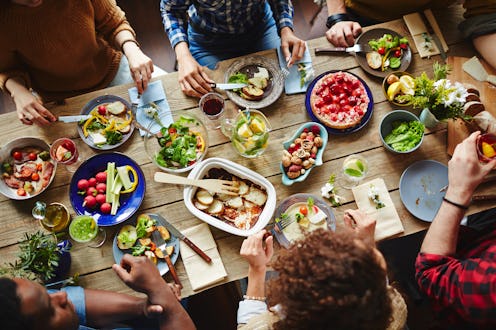Life
These 7 Foods Are Especially Important For Women

As a woman, we have many things to think about, from managing our periods, to gender equality, to protecting our medical and personal needs. With these big issues on the forefront, we may be forgetting the smaller things, such as the foods that are important for women to be eating.
Women go through many more hormonal changes than men do, and we are also have to think about medical conditions we can be especially prone to such as breast cancer and osteoporosis. Eating the right foods can even help protect our fertility later on. Because of this, there are certain crucial nutrients we need to incorporate in our diets, much more so than our male counterparts.
"Women’s nutritional needs change during menstruation, pregnancy, breastfeeding and menopause," says certified nutritionist Franci Cohen over email. "A woman’s reproductive life means that her nutritional needs differ greatly from those of a man." For example, according to Cohen, women need more iron than men to make up for the amount of iron they lose in their menstrual period.
To keep our bodies properly nourished and balanced, there are certain vitamins and minerals that are essential that women consume. Here are seven important foods that are especially important for women to include in their diet.
1. Broccoli
"Broccoli is practically unrivaled among all foods when it comes to protecting against cancer," says Cohen. "Its powerful phytonutrients not only help neutralize carcinogens, but they also stimulate detoxifying enzymes that help the body rid itself of cancer-causing and other harmful toxins." Indole-3-carbinol a compound found in broccoli, has been shown to reduce the risk of breast and cervical cancers and suppress the spread of existing cancer, according to a study published in the Journal of Cellular Biochemistry.
2. Onions
"Onions have many healing and health-promoting properties; they're anti-inflammatory, antibacterial, and a natural blood thinner," says Cohen. Eating onions has also been found to increase bone density, which is especially important for women of menopausal age who are experiencing weak bones, according a study published in the North American Menopause Journal.
3. Leafy Greens
"Leafy greens, such as kale, spinach, watercress, cabbage, turnip greens, collard greens, and arugula, share similar nutrient profiles," says Cohen. These veggies contain high amounts of vitamins including vitamin K, vitamin A, and vitamin C, and they also boast calcium, potassium, beta-carotene, manganese, folate, magnesium, iron, and dietary fiber. Eating these greens can help increase your fertility and your libido, according to Dr. Rami Kaldas for the Kaldas Center for Fertility, Surgery, and Pregnancy.
4. Beans
"No matter what type of bean you choose, each is filled with a rich array of nutrients," [Beans have] been linked to a reduced risk of type 2 diabetes, high blood pressure, and breast cancer," says Cohen.
5. Apples
Apples are a great source of antioxidants, which can help fight cancer, but it is their skin that is especially important for women. The apple skin contains quercitin, a flavonoid that can help prevent and fight against breast cancer tumors, according to a study published in the Journal of Experimental and Therapeutic Medicine.
6. Wild Salmon
"Wild salmon is rich in omega-3 fatty acids, vitamin D, and iron, and it's a high-quality source of protein," says Cohen. Salmon can help combat depression, and it includes nutrients that can help a developing fetus, according to Maureen Callahan, MS, RD for Cooking Light.
7. Beets
Beets are a great source of B vitamins and iron, making them a key choice for pregnant women. Additionally, an American Heart Association study also reported that beet juice is good at bringing blood pressure down.
If you don't like one of these foods or choose not to eat them for one reason or another, your health is probably still in check. However, if you do love one of the above foods, why not eat some extra at your next meal? It certainly won't hurt.
Images: Fotolia